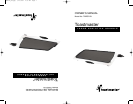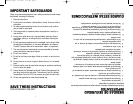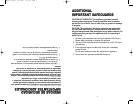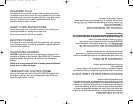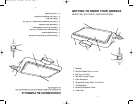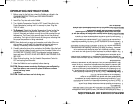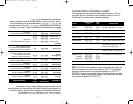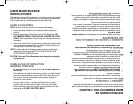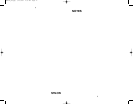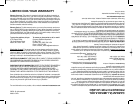INSTRUCCIONES DE
MANTENIMIENTO DEL USUARIO
Este producto requiere de poco mantenimiento. No trate de repararlo usted
mismo. Recurra a un técnico especializado si necesita alguna reparación.
LIMPIEZA Y CUIDADOS
NOTA: Ninguna pieza deberá colocarse en un lavavajillas.
1. Desconecte y permita que la parrilla se enfríe completamente antes de
limpiarla o moverla.
2. Retire el Control de Temperatura (termostato) del contenedor. NO
SUMERJA EL TERMOSTATO, CABLE O CLAVIJA DENTRO DEL
AGUA O EN ALGUN OTRO LIQUIDO. Limpie el Control de
Temperatura (termostato) con un trapo húmedo y seque totalmente.
3. Cuando se enfríe, retire el depósito para escurrimientos y vacíe el con-
tenido. Asegúrese de que el líquido se ha enfriado, retirando el depósi-
to de escurrimientos. Lave la parrilla y el depósito para escurrimientos
en agua jabonosa, enjuague y seque totalmente.
NOTA: Puede utilizar una fibra de plástico con un limpiador no abrasivo
para limpiar la parte inferior de la parrilla (ver TIPS PARA CUIDADO Y
USO DE SU PARRILLA CON ANTIADHERENTE).
PRECAUCIÓN: El termostato y el contenedor del termostato debe
estar completamente seco antes de utilizarla.
CUIDADO Y USO DE SU PARRILLA CON
ANTIADHERENTE
• Para evitar rallar la superficie con antiadherente, no coloque objetos
sobre la parrilla.
• Utilice temperatura de media a baja para obtener mejores resultados
de cocimiento. Temperaturas muy altas pueden causar decoloración y
acortar la duración de vida de su superficie con antiadherente. Si
necesita utilizar temperaturas más altas, precaliente la parrilla a tem-
peratura media por unos cuantos minutos.
• Utilice solamente utensilios de nylon, plástico o madera con cuidado
para evitar rallar la superficie. Nunca corte comida sobre la parrilla.
• Retire manchas difíciles con una fibra de plástico y un limpiador suave
no abrasivo; NO UTILICE FIBRA METALICA.
7
USER MAINTENANCE
INSTRUCTIONS
This appliance requires little maintenance. It contains no user serviceable
parts. Do not try to repair it yourself. Any servicing requiring disassembly
must be performed by a qualified appliance repair technician.
CARE & CLEANING
NOTE: No parts should be placed in an automatic dishwasher.
1. Unplug and allow Griddle to cool completely before cleaning or
moving.
2. Remove Temperature Control Probe from Probe Receptacle. DO
NOT IMMERSE PROBE, CORD OR PLUG IN WATER OR OTHER
LIQUID. Wipe Temperature Control Probe with a damp cloth and dry
thoroughly.
3. When cool, remove Drip Tray and empty contents. Be sure the liquid
has cooled before removing Drip Tray. Wash Griddle and Drip Tray
in soapy water; rinse and dry thoroughly.
NOTE: A plastic pad with mild abrasive cleaner may be used to clean
underside of Griddle (see HINTS FOR CARE & USE OF NON-
STICK GRIDDLE SURFACE below).
CAUTION: Probe and Probe Receptacle must always be completely
dry before use.
CARE & USE OF NON-STICK
GRIDDLE SURFACE
• To avoid scratching the non-stick surface, do not stack objects on
the Griddle.
• Use medium to low heat for best cooking results. Very high tempera-
tures can cause discoloration and shorten the life span of any non-
stick surface. If higher temperatures are necessary, preheat on
medium for a few minutes.
• Use only nylon, plastic, or wooden utensils with care to avoid
scratching the non-stick surface. Never cut food on the Griddle.
• Remove stubborn stains with a plastic scouring pad and mild dish
washing liquid; DO NOT USE STEEL WOOL.
7
TMEG21W_IB.qxp 1/19/2007 2:50 PM Page 15



